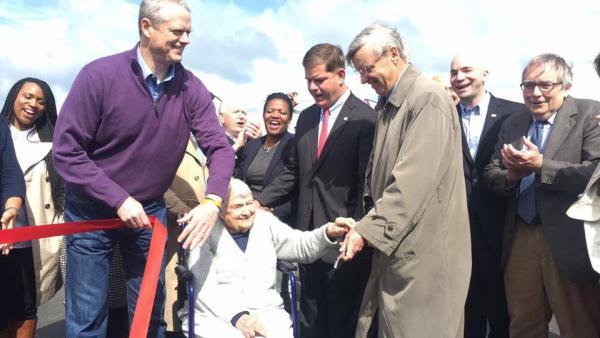May 10, 2017

Gov. Charlie Baker, Mary Maloney, former Sen. W. Paul White, Sen. Linda Dorcena Forry, Mayor Marty Walsh Steven Finnegan and Rep. Dan Hunt at the official opening of Sen. Joseph Finnegan Park on May 6. Photo courtesy Rep. Dan Hunt
The 15-acre stretch along the banks of the Neponset River has long ridden the razor’s edge of becoming a dumping place for hazardous waste, home to gas tanks, a docking site for natural gas tankers, or adjacent to a proposed site of a stadium for the then-Boston Patriots.
Last Saturday, three years after the state dedicated $4.25 million in funding to transform the former Schaffer paper site in Port Norfolk into a passive state park, officials gathered in the newly named Senator Joseph Finnegan Park (he represented Dorchester in the House of Representatives and the State Senate during the Great Depression) to celebrate a family that has championed the land and the surrounding community for decades.
“When I was a kid growing up in Neponset, the names Finnegan, White, and Hunt were names that were well-respected,” said Port Norfolk Civic Association president John Lyons. “They were people who were active in the community, and active in the parish, and, ultimately, active in government. And they set very high standards.”
It was during those days that the park along the Neponset was conceived, he said as he recalled riding around on the T and staring at the Charles River esplanade. “We always thought we would never see anything that nice in Dorchester,” he said. “Now here we are today. It has actually happened.”
After three decades, the cleanup and rehabilitation of the area is complete, and another critical link is in place along the Neponset River trail that stretches from Castle Island to Hyde Park.
Gov. Charlie Baker presided over the park’s opening on Saturday, accompanied by Energy and Environmental Affairs Secretary Matthew Beaton, Mayor Martin Walsh, Department of Conservation and Recreation Commissioner Leo Roy, elected city and state officials, and neighborhood leaders.
Joseph Finnegan was born in Co. Mayo, Ireland, in 1898, joining a family of nine siblings. He moved to the United States in 1916 to live with two older siblings who had already made Massachusetts their home. “Thus began the typical story of immigrants who came to America at that time, and supported one another,” said Joseph’s son Steven, who shared the mission of his father, his brother John, and the rest of the family to preserve and protect the land for the park that was opened on Saturday.
Living with his siblings Pat and Helen in the states during World War I, Joseph was an exemplary student who finished high school in Holyoke in two years, and entering Bowdoin College.
The three siblings moved to King Street in Dorchester for Joseph to attend Boston University School of Law, after which he opened and maintained a law practice in Boston.
He was elected state representative for the district in 1926, and met his future wife, Port Norfolk native Julia Kendrigan, while going door-to-door during a successful 1928 reelection campaign. They married in 1929 and had nine children, “all of whom served the community as teachers, lawyers, and public servants,” Steven said.
Elected to the state Senate in 1930, Finnegan served as Senate minority leader in 1933 and 1934, leading a “close knit band” of 13 Democrats in the 40-member body. His fight to preserve the Dorchester coastline included resisting a Boston Gas Company proposal to build dozens of gas tanks along the riverfront where the rainbow gas tank stands today. The tanks were instead located in Everett.
Decades later, during John Finnegan’s 1967 to 1981 tenure as a state representative, he led the Dorchester legislative delegation in defeating an early 1970s Gas Company effort to add LNG tanks to its Commercial Point site.
Unsettled by the Expressway “effectively walling off people from their waterfront, while offering no mitigation,” John Finnegan pledged in his successful 1966 first election campaign to have the Dorchester waterfront restored from Granite Avenue to Malibu Beach and, by extension, to Castle Island.
“You would think that the creation of the parks would be welcomed and supported by all,” Steven said, ruefully. “Unfortunately, 50 years of delay do not happen by accident.”
Boston Patriots owner Billy Sullivan wanted to build a stadium on the land that now includes John Paul II Park, “which would have had enormous negative consequences for traffic, parking, and the quality of life for St Brendan’s and the entire Dorchester community.”
John Finnegan and his Dorchester legislative colleagues opposed and defeated the project, sparking Sullivan’s ire. The Patriots’ owner “upbraided” the legislator at a public function, announcing he would change the name from the Boston Patriots to the New England Patriots. “John’s retort was “that’s a great trade,’ ” Steven said.
The state claimed the Port Norfolk land in 1986, and the former lumber site languished in disuse for decades.
Those at the opening toasted then-state representative Walsh, state Sen. Linda Dorcena Forry, state Rep. Dan Hunt, and City Councillor Frank Baker among others. Engaged citizens like Mary McCarthy, the Lyons family, Ben Tankle and his late wife Barbara, Mary Maloney and Freda Nolan worked tirelessly to see the project through, they said.
“My mother and father passed away in 1960 and 1962 respectively,” Steven Finnegan concluded, as the wind buffeted the new park. “Without question they would be overjoyed to see people using this park, access to which was closed off to the public for decades. This last link of the Dorchester waterfront and park restoration is aptly named for my father, and by extension my mother, who both had such close ties to Port Norfolk.”
Topics:


